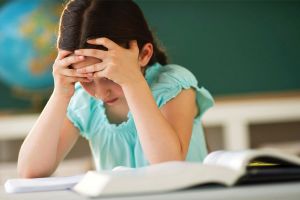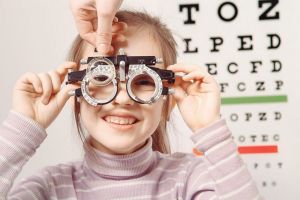If your started wearing glasses as a kid yourself, you’d probably know what it feels like to go without them. Perhaps you can recall trying to make out what was written on the blackboard? Or not recognising a friend until he or she is right in front of you?
Today, an increasing number of those who wear glasses are alarmingly from an age group that drinks from a sippy cup or needs to be driven around for play dates. If you suspect your child is struggling with poor eyesight, take charge of the situation by learning the facts, identifying the cues and be prepared if junior requires glasses.
Table of Contents
You’ll have to notice these things
Very few kids actually tell their parents or caregiver that they have an eyesight issue, mostly because they don’t realise that they do! Think about it, if a young child can’t see something clearly, he or she will automatically do whatever it takes to have a clearer vision, which include squinting, tilting their head, getting really close to an object to see it, etc. If no one checks them in time, they will just continue to do this because it’s the only way they know that will help them see a little better. So, really, it’s up to parents to notice certain things and take swift action to help them.
Here are some clues that may hint of a vision problem in your child:
Tripping or bumping into objects
It’s understandable that kids love to run, and knocking into things is inevitable, especially if they’re too excited while playing. However, if it happens way too many times, it’s time to observe a little closer and see if the reason could be that they just can’t see properly.
Tilting the head
Tilting the head can be a sign of an eye muscle imbalance or strabismus. A child may have double vision when looking down or from a certain angle or direction. Tilting the head may minimise the double vision, but it cannot and should not be a long-term solution. If you see your child tilting his head each time he wants to get a better look at something, then an eye check-up is in order.
Sitting too close to the television
This can be a tough one. Most, if not all kids love sitting close to the TV; it probably just feels like they’re so much closer to the exciting adventures taking place on the screen. As parents, it’s your duty to check this, and it’s the best way too, to check if your child can or cannot see clearly if seated at a decent distance from the TV. If he or she keeps trying to get back close to the TV, or perhaps even complain that they can’t see very well from the sofa, it’s probably time for an appointment with the eye-doctor.
Covering one eye to read or watch television
A child who covers one eye could simply be imitating a one-eyed bandit he saw on television. Or, he could be trying to shut off the eye with a poor vision, so that it does not interfere with the vision of the better eye. If you see your child doing this repeatedly, ask him why he’s doing it. If it’s because he can’t see properly, then he needs to have an eye check-up as soon as possible. An uncorrected vision problem in one eye can increase a child’s risk of developing amblyopia (lazy eye syndrome). Covering one eye can also be a sign of double vision caused by strabismus or a more serious medical problem, such as a cataract.
Rubbing the eyes
Rubbing the eyes is a sign of eye fatigue caused by vision problems. Medical conditions such as allergic conjunctivitis can also lead to excessive eye-rubbing. In any case, it needs to be looked at.
Finger pointing while reading
Finger pointing while reading could mean the child is a slow reader, but it could also be sign of a vision problem, such as amblyopia. Amblyopic eyes may experience a “crowding” phenomenon. Kids with amblyopic eyes find it difficult to recognise words that appear very close to other letters or words.
Light sensitivity
Children with exotropia, a type of strabismus, occasionally squint their eye or eyes when exposed to bright sunlight. This could be interpreted as light sensitivity which can be better managed if detected and addressed in time
Don’t wait till it’s too late
Everyone deserves to have good eyesight, but children may not know any better when they have issues with theirs. Don’t wait or put on hold something as crucial as an eye check-up, especially if your child shows signs of having eye issues. Poor vision can have a very negative impact on children’s learning capabilities, their childhood experiences and their future too.



















